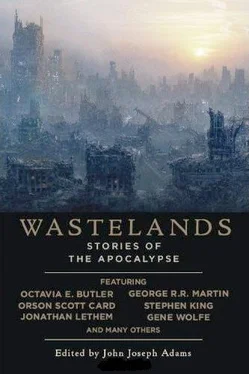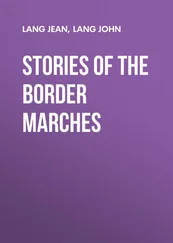Emswhiller can’t help but wonder if our civilization will fall apart one of these days. But being the kind of person who loves the simple life—oil lamps, walking, pumping up water for a shower, washing diapers at the shore of a lake on an old fashioned washboard—she’s hesitant to say she’s “afraid” it’ll happen. She’s not looking forward to it either, but she says it’s just as much fun writing about regression and devastation as it is writing about a future full of new gadgets and inventions.
“Killers” grew out of Emshwiller’s objections to the war in Iraq. The American people have been told that we’re fighting terrorists over there so we don’t have to fight them here. This story ponders what it would be like afterward if such a war did come to our shores.
Most people left because of no water. I don’t know where they found a place where things were any better. Some of us felt safer here than anywhere else. And even way before the war wound down, it was hard to pick up and go someplace. No gas for civilians. Pretty soon no gas at all.
After the bombing of our pipeline (one man with a grenade could have done that), we got together and moved the town up higher, along a stream and put in ditches so that the water came past several houses. We have to carry water into the house in buckets and we have to empty the sink by hand, back out into the yard. At least the water flows into our kitchen gardens and past our fruit trees. In warm weather, we bathe in our irrigation ditch, in colder we sponge off inside, in basins, but there’s hardly any cold weather anymore.
There wasn’t much to moving the town since most of us were gone already. All the able-bodied men, of course, so it took us women to make the move ourselves and without horses or mules. The enemy stole them or killed them or maimed them just to make things harder for us.
No electricity, though some of the women think they can hook the dam back up and get some. Nobody has bothered to try it yet. In a way none of this bothers me as much as you’d think. I always liked walking, and we have rendered fat lamps and candles that send out a soft, cozy glow.
Our house was already well above where the town used to be. Good because I didn’t want to move. I want my brother to have our old home to come back to. And besides, I couldn’t move Mother.
Beyond our back yard there used to be the Department of Water and Power, after that Forest Service land, and then the John Muir wilderness. Now the town has moved above me, and of course there’s no DWP or Forest Service anymore.
Our house has a good view. We always sat on the front steps and looked at the mountains. Now that everybody has moved up the mountain side, everybody has a good view.
The town below is empty. The Vons and K-mart are big looted barns. Up here there’s one small store where we sell each other our produce or our sewing and knitting. Especially socks. Hard to get socks these days. Before the war we were so wasteful nobody darned anymore, but now we not only darn but reinforce the heels and toes of brand new socks before we wear them.
We moved the little library up. Actually it’s got more books than before. We brought all the books we could find, ours and those from the people who left. We don’t need a librarian. Everybody brings them back honor system.
We have a little hospital but no doctors, just a couple of elderly nurses who were too old to be recruited. They’re in their seventies and still going. They’ve trained new ones. No medicines though. Only what we can get from local herbs. We went to the Paiute to find out more. There’s a couple of Paiute nurses, who come to help out every now and then, though they have their own nursing to do on the reservation. (They moved the rez up, too, and they don’t call it the reservation anymore.)
It’s a woman’s town now. Full of women’s arts and crafts…. Quilt makers, sweater knitters…. And the women do the heavy work. There’s a good roof repair group and there’s carpenters….
Lots of women went to war along with the men, but I had to look after Mother. I was taking care of her even before my brother left. She wasn’t exactly sick but she was fat and she drank. Her legs looked terrible, full of varicosities. It hurt her to walk so she didn’t. When the war came she got a little better because of the shortages, though there was still plenty of homemade beer, but she couldn’t walk. Or wouldn’t. I think her muscles had all withered away. Looking after somebody who can’t walk seems normal to me. I’ve done it since I can first remember anything.
Now that Mother’s gone I have a chance to do something useful. If I knew the war was still going on in some specific place, I’d go fight, but it seems to be over. Maybe. It didn’t stop exactly. I don’t know how it ended or even if it’s ended. We don’t have a way to find out, but there hasn’t been any action that we know of for quite some time. Overhead, nothing flies by. Not even anything old fashioned. (Not that we ever had any action to speak of way out here. Except for the bombing of our pipeline and stealing our livestock, nobody cared much about us.)
But that’s the way the war was, hardly a beginning and hardly an end. Wars aren’t like they used to be—with two clearly separated sides. The enemy was among us even before it started. They could never win a real old-fashioned war with us, they were weak and low tech, but low tech was good enough as long as there were lots of them. You never knew who to trust, and we still don’t. Our side put all we could in internment camps, practically everybody with black eyes and hair and olive skin, but you can’t get them all. And then the war went on so long we used up all our resources, but they still had theirs—sabotage doesn’t ever have to stop. They escaped from the camps. Actually they just walked away. The guards had already walked away, too.
Lots of those men brought their injuries and craziness to our mountains. Both sides came here to get away from everything. They’re hermits. They don’t trust anybody. Some of them are still fighting each other up there. It’s almost as bad as having left-over mine fields. They’re all damaged, physically or mentally. Of course most likely all of us are, too, and we probably don’t even know it.
My brother might be out there somewhere. If he’s alive he’s got to be here. He loves this place. He hunted and trapped and fished. He’d get along fine and I know he’d do anything to come back.
Most of those men don’t come down to us even if they’re starving or cold or sick. Those that do, come to steal. They take our tomatoes and corn and radishes. Other things disappear, too. Kitchen knives, spoons, fishhooks…. And of course sweaters and woolen socks…. Those crazies live up even higher than we do. It does still get cold up there.
And they are crazies. And now one of them has been killing other men and dumping them at the edge of the village. They’ve all been shot in the back by wooden crossbow darts. Beautifully carved and polished. I hope it isn’t one of our side. Though I don’t suppose sides matter anymore.
Every time this happens, before we put them into the depository, I go to check if it’s my brother. I wouldn’t want my brother in the depository. Ever. But those men are always such a mess—dirty and bearded—I wonder, would I recognize him? I keep thinking: How could I not? But I was only fifteen when he left. He was eighteen. He’d be thirty-two now. If he’s alive.
We’re all a little edgy even if it’s not us getting killed. And then last night I saw someone looking in my window. I’d been asleep but I heard a noise and woke up. I saw the silhouette of a lumpy hat and a mass of tangled hair flying out from under it, the moonlit sky glowing behind. I called out, “Clement!” I didn’t mean to. I was half asleep and in that state I knew it was my brother. Whoever it was ducked down in a hurry and I heard the crunch, crunch of somebody running away. Afterwards I got scared. I could have been shot as I slept.
Читать дальше












